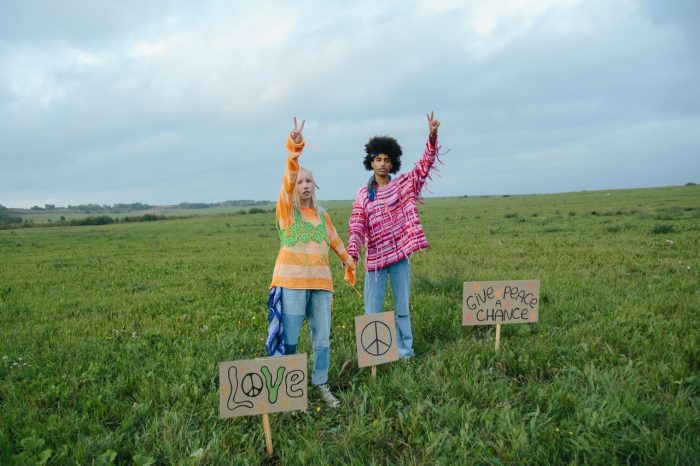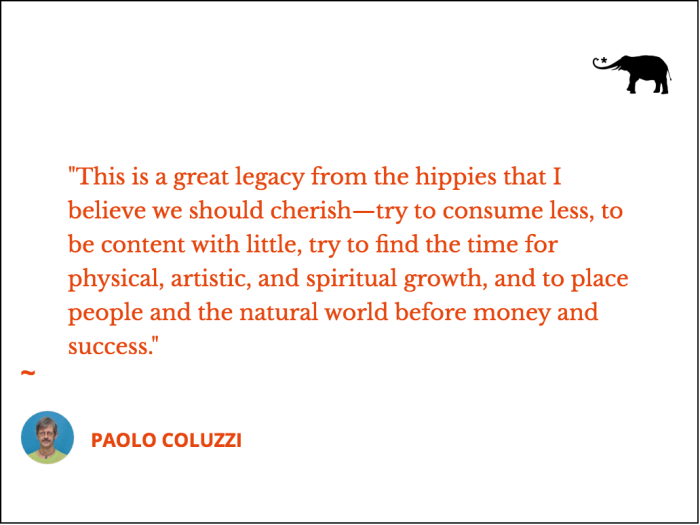In this time of stress, fear, and environmental degradation, I often think of the hippies—the generation of freethinking youngsters who marked the 1960s deeply.
I think of them because it seems to me that the answer they gave to the conformism, fears, and violence of their times was the best possible: love and peace, and dropping out of this soul-devouring, greedy, and competitive society that has placed money at the centre of everything.
I believe that if the message they left was taken up again by enough people, perhaps we would have more hope for happiness and well-being in a clean world.
What I see around me is people working, working, working, spending hours in their polluting cars, commuting in a polluted environment, and ending up watching brainwashing TV programmes because they are too tired to do anything else.
In the best cases, there’s a weekend at the end of the five stressful days when they can relax a bit, see some friends perhaps, or do some physical activity. I may be exaggerating a little, I know, but I don’t think what I’m saying is very far from the reality that surrounds us.
And why do we work so hard, to the point of getting stressed and depressed? For money…money for what? For some, perhaps, it might just be money to survive. For many, however, it is money to get a bigger house, a fancier smartphone, a bigger car (which will leave a bigger environmental footprint).
For those who are aware of the harmful lives they are leading, the dream may be to use the money to get away someday, perhaps to find a place to live in the countryside, or to travel around the world. For many, unfortunately, this will remain a dream, and some may die before because of stress and pollution.
It seems almost impossible to get out of this harmful circle that seems to dominate our lives. One may try to change the status quo through politics; there have been even revolutions in the past that allegedly aimed at improving society, but it was always to little or no avail. The only way out, it seems to me, is another kind of revolution, one that can take place within and around us. And many hippies just did this.
First of all, the hippies rejected money (and stressful and unhealthy jobs to get it) as a core value and tried to live with as little of it as possible. In the hippie enclave of Haight-Ashbury in San Francisco, there was a free clinic run by volunteering sympathetic doctors, free food given out once a day by the Diggers, and even free shops where one could get whatever they needed without having to pay a dime. Things that were unheard of. They also believed in nature and natural ways, which was one of the reasons many hippies established rural communities to live in.
The most important thing, however, was that the hippies questioned everything, particularly what was held as most valuable and important by the “straight” society. Apart from money, they questioned the need to work so much and to own too much; they questioned the nuclear family, the war in Vietnam, conformity in dressing and mainstream fashion, the typical high cholesterol diet, overuse of chemical medicines, and even mainstream religion.
They tried different ways, they dressed differently, they let their hair grow, some became vegetarian, they started meditating or trying other Asian practices; not everything worked, of course, but they tried, they experimented new ways to live a happier, more fulfilling, and more environmentally friendly life.
Even if failures were perhaps more common than successes, even though they were often harassed by members of the mainstream society, they tried hard (and I’m referring to the “hardcore” hippies here who wanted to make this world a better one).
I see a parallel with what the Buddha said in the famous Kalama Sutta: never believe anything just because it comes from a famous teacher or from tradition because everybody believes it or just because it sounds logical. You have to try it out and see if it’s good for you and the people around you; if it isn’t, then it needs to be rejected.
This is a great legacy from the hippies that I believe we should cherish—try to consume less, to be content with little, try to find the time for physical, artistic, and spiritual growth, and to place people and the natural world before money and success.
In short, more love and more peace toward ourselves and toward the whole world.
~
 Share on bsky
Share on bsky







Read 9 comments and reply